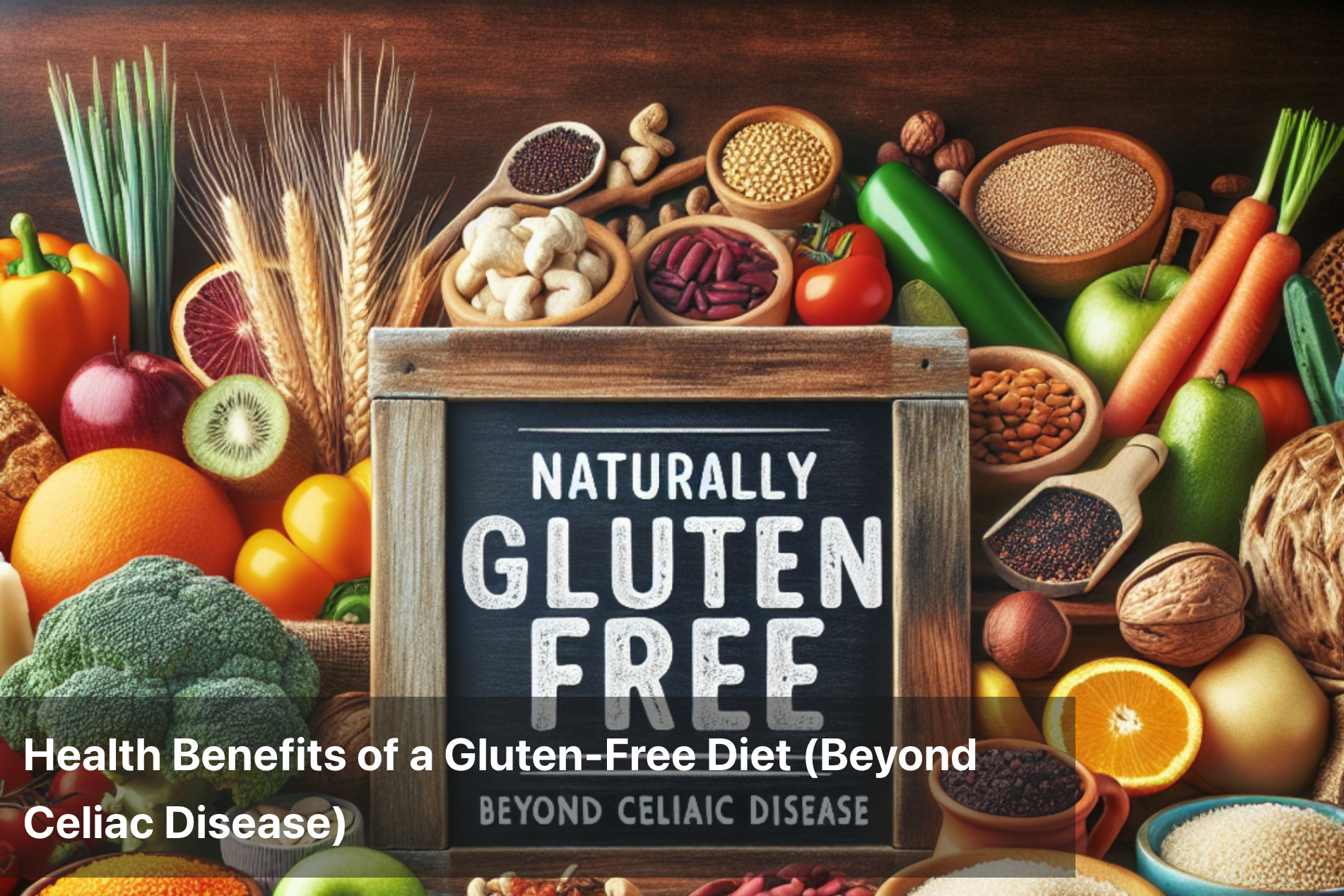
Health Benefits of a Gluten-Free Diet (Beyond Celiac Disease)
A gluten-free diet is medically necessary for individuals with celiac disease, but many people without this autoimmune condition are also adopting gluten-free lifestyles and reporting improvements in their health. While it’s important not to follow trends blindly, there are legitimate health benefits that can extend beyond treating celiac disease—particularly when a gluten-free diet is rich in whole, unprocessed foods and properly balanced.
From reducing inflammation and improving gut health to enhancing mental well-being and skin quality, going gluten-free may offer more advantages than commonly recognized. These benefits are especially noticeable in people with underlying sensitivities, digestive issues, or chronic inflammation.

Reduced Inflammation and Joint Pain
Chronic inflammation contributes to numerous health conditions, including arthritis, cardiovascular disease, and autoimmune disorders. Gluten has been found to trigger inflammation in sensitive individuals, even those without celiac disease. For some, removing gluten from the diet can help reduce joint pain, swelling, and stiffness.
People with rheumatoid arthritis and fibromyalgia, in particular, have reported symptom relief after eliminating gluten. Although not a cure, gluten-free eating may act as a supportive strategy in managing inflammatory flare-ups and improving joint mobility.
Improved Digestive Function in Sensitive Individuals
Even in the absence of celiac disease, gluten can cause gastrointestinal discomfort in certain people. This condition—often referred to as non-celiac gluten sensitivity—doesn’t involve intestinal damage but may still produce bloating, cramping, gas, or irregular bowel movements.
Eliminating gluten may restore gut balance in these cases and help support a healthier digestive rhythm. When gluten is removed and replaced with fiber-rich, naturally gluten-free foods such as vegetables, legumes, and whole grains like quinoa or millet, it often leads to more consistent digestion and better nutrient absorption.
Alleviation of Chronic Headaches and Migraines
For individuals who frequently suffer from unexplained headaches or migraines, gluten could be a hidden trigger. Some people experience neurological symptoms after consuming gluten, including brain fog, dizziness, or persistent headaches.
Studies have shown that people with gluten sensitivity may find relief from migraines and cognitive symptoms when gluten is removed from the diet. This effect may be linked to reduced inflammation in the brain and improved nutrient absorption, especially of B vitamins, which play a role in neurological health.
Positive Impact on Skin Health
Skin is often a reflection of internal health, and gluten-related issues can manifest through skin conditions like eczema, psoriasis, or dermatitis herpetiformis (a rash associated with celiac disease). Even without a clinical diagnosis, some people notice that eliminating gluten leads to clearer, more hydrated skin.
A gluten-free diet that emphasizes anti-inflammatory foods—such as leafy greens, fatty fish, and antioxidant-rich fruits—can further support skin regeneration and reduce acne or irritation caused by inflammatory triggers.
Better Mood and Emotional Stability
Food directly affects brain chemistry, and gluten has been associated with changes in mood and mental clarity in sensitive individuals. Gluten-induced brain fog, anxiety, and depressive symptoms are often under-recognized but can significantly impact daily life.
For some, gluten elimination leads to increased energy, clearer thinking, and a more stable emotional state. This may be especially beneficial for people with mood disorders or neurodivergent conditions like ADHD or autism, where food sensitivities can exacerbate symptoms.
Improved Hormonal Balance
Some people with hormonal imbalances, especially women with PCOS or thyroid disorders, have reported symptom improvement on a gluten-free diet. While not a universal solution, avoiding gluten may reduce inflammation, stabilize blood sugar, and lessen endocrine stress in those sensitive to wheat-based foods.
In conditions like Hashimoto’s thyroiditis, an autoimmune thyroid disorder, removing gluten may reduce the antibody load and help improve thyroid function over time. Pairing a gluten-free diet with proper medical care can be a supportive measure for hormonal regulation.
Enhanced Immune System Performance
A weakened or overactive immune system can lead to increased infections, autoimmune conditions, or chronic fatigue. Gluten can trigger immune dysregulation in certain people, especially when gut health is compromised. Removing gluten may reduce the immune burden and support more balanced immune activity.
This is particularly relevant for those dealing with multiple food sensitivities or low-grade immune responses, who may benefit from a diet low in irritants and rich in whole, unprocessed foods.
Comparison of Potential Gluten-Related Symptoms
Many gluten-related symptoms mimic other health issues, making them easy to overlook. Understanding these can help in identifying whether gluten could be a contributing factor.
|
System Affected |
Common Gluten-Related Symptoms |
|---|---|
|
Digestive |
Bloating, gas, cramps, diarrhea, constipation |
|
Neurological |
Headaches, brain fog, dizziness, migraines |
|
Skin |
Rashes, acne, eczema, dry skin |
|
Musculoskeletal |
Joint pain, muscle stiffness, fatigue |
|
Emotional & Cognitive |
Anxiety, mood swings, irritability, concentration issues |
|
Immune System |
Frequent infections, autoimmune flare-ups |
Removing gluten for a trial period and tracking changes can help determine if these symptoms are linked to gluten sensitivity.

Best Practices for a Healthy Gluten-Free Diet
While the benefits of a gluten-free diet are real for some, they depend heavily on how the diet is implemented. Simply swapping wheat-based products for packaged gluten-free alternatives often leads to poor nutrition, as many of these are high in starch, sugar, and additives.
-
Focus on whole, naturally gluten-free foods: vegetables, fruits, lean proteins, legumes, nuts, and seeds
-
Incorporate gluten-free whole grains: quinoa, buckwheat, millet, and brown rice
-
Limit gluten-free junk food and refined starches like white rice flour, corn starch, and potato starch
-
Stay hydrated and include plenty of fiber-rich foods to support digestion
-
Consider periodic nutrient assessments, especially for B vitamins, iron, and magnesium
A clean, whole food-based gluten-free diet provides the foundation for the health benefits mentioned above.
Summary
While celiac disease is the most recognized reason to avoid gluten, a growing number of people are experiencing health improvements from gluten-free eating even without a formal diagnosis. From clearer skin and better digestion to improved mood and reduced inflammation, the benefits extend across multiple systems of the body.
When approached with intention and nutritional balance, a gluten-free diet can support a healthier lifestyle. For those seeking clean, wholesome, and delicious gluten-free options, Lofoods offers thoughtfully crafted products to complement every wellness journey.
This Blog post is an initiative by Lo! Foods, to provide accurate and Nutritionist / Doctor approved information related to Health. Lo! Foods is India's leading brand for Everyday Functional Foods. Foods designed for specific Health conditions or Needs. Lo! Foods also runs India's largest range of Low Carb Healthy Cloud Kitchens, under the brand names of Lo!, ProteinChef, ATH (All Things Healthy) and DiabeSmart.















Leave a comment
Your email address will not be published.